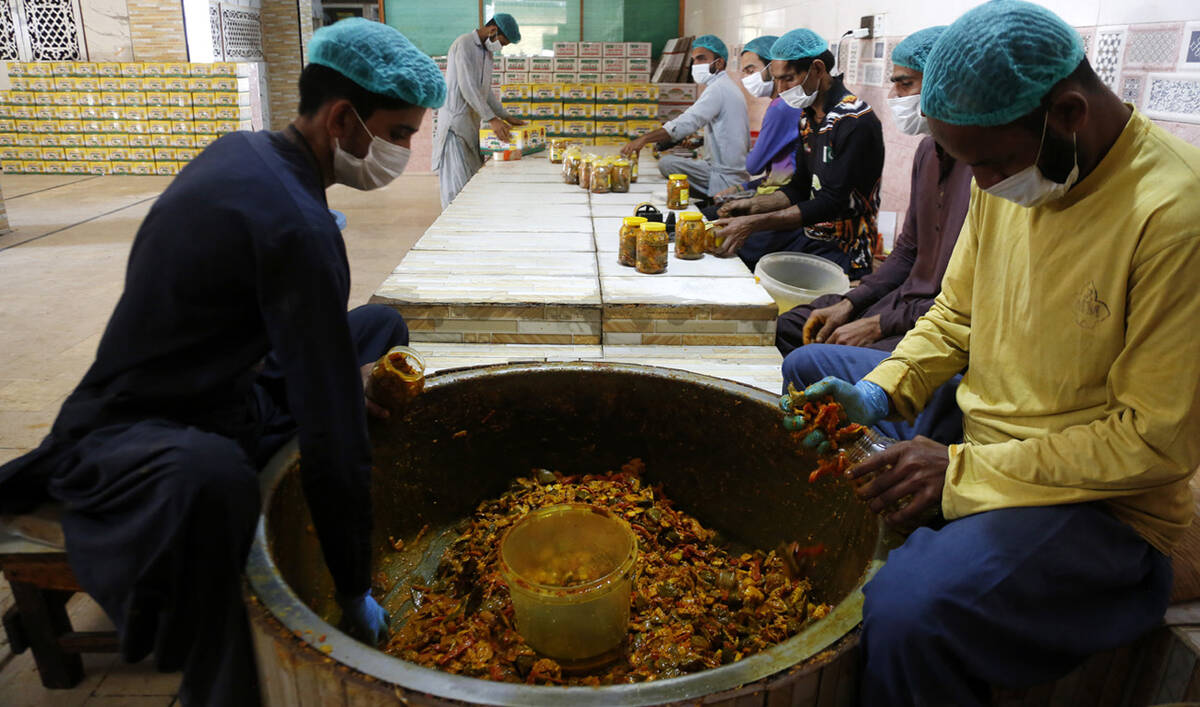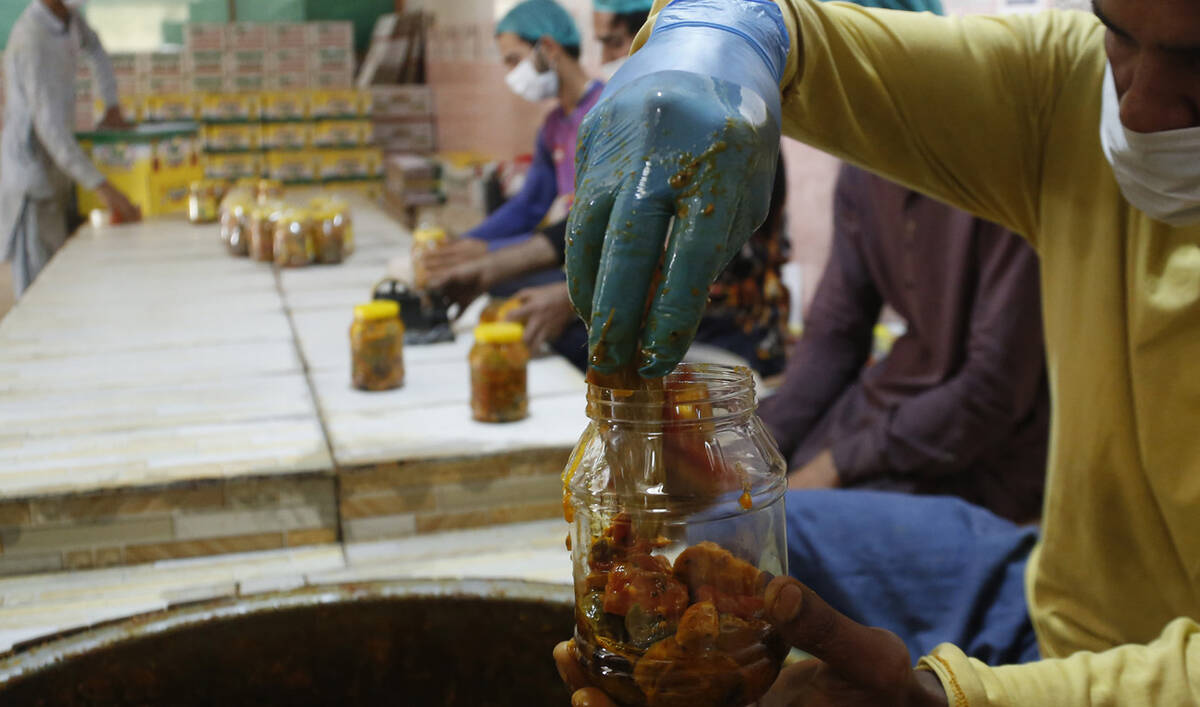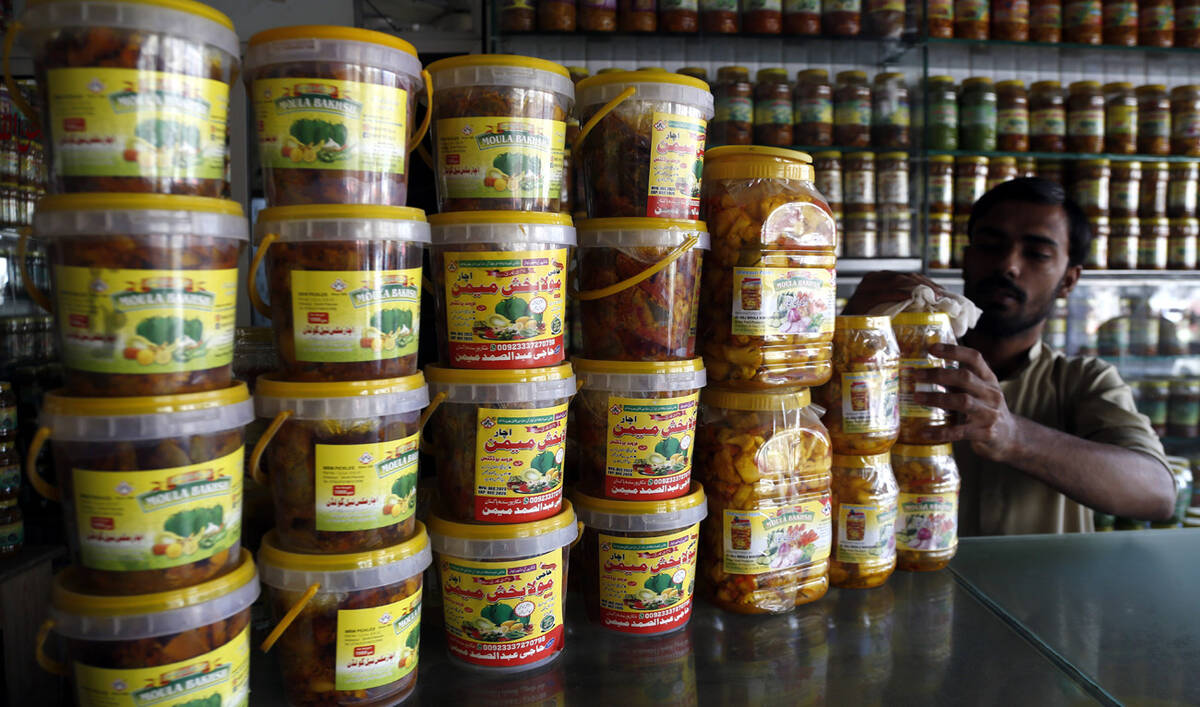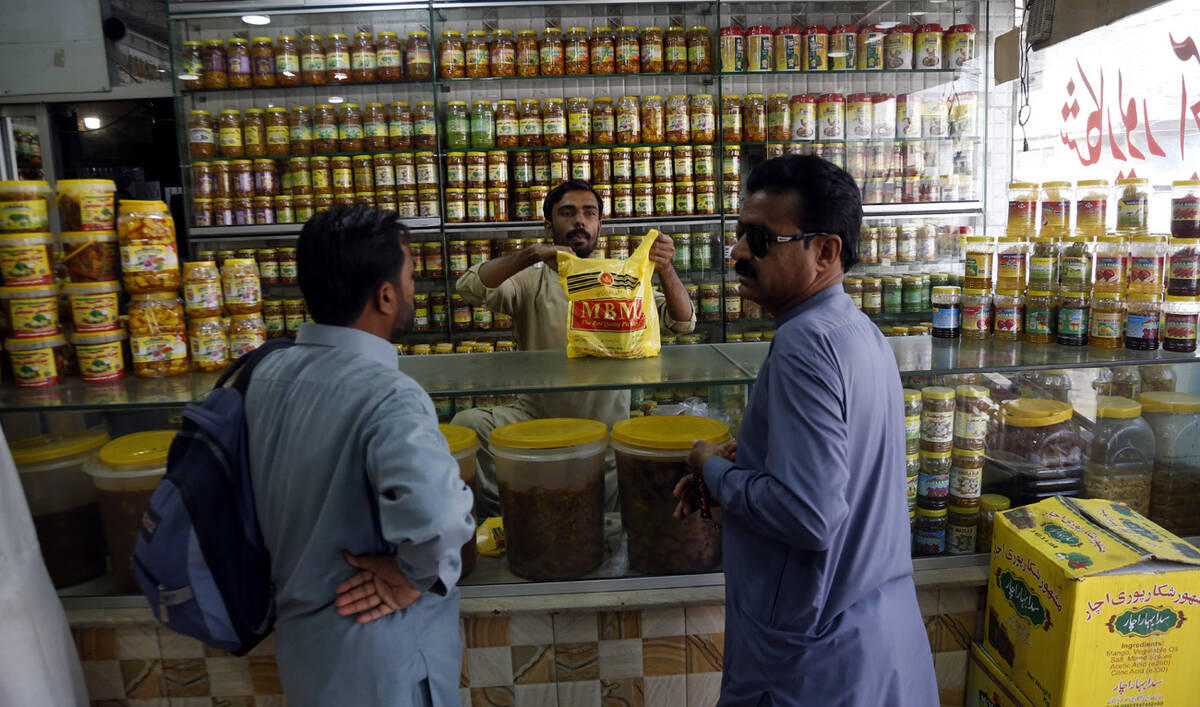KARACHI: Prime Minister Shehbaz Sharif on Friday directed to form of a committee comprising industrialists and cabinet members to ensure sustainable economic growth, instructing it to offer recommendations within two weeks.
The move comes as Pakistan grapples with a fragile economy that has witnessed multiple boom-bust cycles over the past decades, forcing successive governments to seek external financial assistance, including repeated bailouts from the International Monetary Fund (IMF). Sharif’s administration is focusing on increasing exports and attracting investment to drive long-term growth.
The prime minister decided to set up the committee during a meeting with a delegation of prominent businessmen and industrialists, where he highlighted the government’s commitment to create a business-friendly environment.
“The prime minister has sought suggestions from business personalities and industrialists regarding sustainable improvement in the country’s growth rate,” said a statement released by his office after the meeting. “He has directed the formation of a committee comprising business figures, industrialists and government ministers.”
“This committee will provide recommendations to the government within two weeks to achieve sustainable growth,” it added.
Sharif emphasized that boosting exports was the most effective way to improve the growth rate, noting that his administration had been working to facilitate businesses and attract foreign direct investment.
He also pointed to the establishment of the Special Investment Facilitation Council (SIFC), which provides a one-window platform for investors, streamlining bureaucratic hurdles and offering incentives to businesses.
“The government is working on a priority basis to promote industry and business in the country,” he was quoted as saying during the meeting. “The business community and industrialists are the backbone of the country’s economy, and resolving their issues is our top priority.”
He highlighted recent improvements in macroeconomic indicators while acknowledging the need for further efforts to ensure the benefits of economic stability also begin to reach the public.
Pakistan PM forms committee to boost economic growth, seeks recommendations in two weeks
https://arab.news/wa2bq
Pakistan PM forms committee to boost economic growth, seeks recommendations in two weeks

- Shehbaz Sharif says the most effective way to improve the growth rate is to increase the country’s exports
- The prime minister wants the leading business personalities and industrialists to be part of the committee
Pakistan extends deadline for expulsion of Afghans

- The deadline has been shifted to next week due to Eid holidays in the country
- Authorities in Kabul have urged countries hosting Afghans not to force them out
ISLAMABAD: Pakistan has postponed a deadline for hundreds of thousands of Afghans to return to their country due to Eid Al-Fitr holidays marking the end of Ramadan, a government official told AFP on Tuesday.
In early March, Islamabad announced a deadline of the end of the month for Afghans holding certain documentation to leave the country, ramping up a campaign to send Afghans back to their homeland.
“The deadline has been extended until the beginning of next week due to Eid holidays,” the official said on the condition of anonymity as he was not authorized to speak to the media.
Afghans holding Afghan Citizen Cards (ACC) — issued by Pakistan authorities and held by 800,000 people, according to the United Nations — face deportation to Afghanistan after the deadline.
More than 1.3 million Afghans who hold Proof of Registration (PoR) cards from the UN refugee agency, UNHCR, are also to be moved outside the capital Islamabad and neighboring city Rawalpindi.
The UN says nearly three million Afghans live in Pakistan, many having fled there over decades of war in their country and after the return of the Taliban to power in Afghanistan.
“Many have been living in the country for years and going back means going back to nothing,” Pakistani human rights lawyer Moniza Kakar told AFP.
Ties between the neighboring countries have frayed since the Taliban takeover, with Pakistan accusing Kabul’s rulers of failing to root out militants sheltering on Afghan soil, a charge the Taliban government denies.
A delegation from Islamabad met with officials in Kabul in March, with Pakistan emphasizing the importance of security in Afghanistan for the region.
The Taliban government has repeatedly called for the “dignified” return of Afghans to their country, with Prime Minister Hassan Akhund urging countries hosting Afghans not to force out them out.
“We ask that instead of forced deportation, Afghans should be supported and provided with facilities,” he said in an Eid message the day before Pakistan’s original deadline.
Rights groups have condemned Pakistan’s campaign.
Human Rights Watch slammed “abusive tactics” used to pressure Afghans to return to their country “where they risk persecution by the Taliban and face dire economic conditions.”
Afghan girls and young women would lose rights to education if returned to Afghanistan, as per Taliban authority bans.
Amnesty International condemned the removal of Afghans in Islamabad awaiting resettlement in other countries, saying they would be “far from foreign missions who had promised visas and travel documents, and risk deportation due to the increased difficulty in coordinating their relocation with missions such as the United States.”
Following an ultimatum from Islamabad in late 2023 for undocumented Afghans to leave Pakistan, more than 800,000 Afghans returned between September 2023 and the end of 2024, according UN figures.
Spiced to perfection: How a small southern city became Pakistan’s pickle powerhouse

- Shikarpuri achar traces roots to pre-partition India when the local Hindu community perfected its intricate preparation
- From humble beginnings, Shikarpur’s achar industry has grown into network of factories, shops and home-based ventures
SHIKARPUR, Sindh: Few table spreads in Pakistan are complete without a jar of pickles, their tangy, spicy, and complex flavors adding punch to main dishes like lentils, curries and rice.
One city in Pakistan has become synonymous with the production of achar, or pickles as they are called in Urdu.
Located deep in the heart of the southern Sindh province, Shikarpur has been churning out some of the country’s most beloved achar for generations, selling to shops around the country and also exporting to the UK, US, UAE, Saudi Arabia and other countries.
Shikarpur city houses at least 12 pickle manufacturing factories, which run networks of shops. The main brands include Hajji Mola Bux Memon, Hajji Sikander Memon, Tahir Shabir Shaikh, Nisar Ahmed Memon, Shah Nawaz Soomro, Soomra, and Nawab Memon. Other small home-based manufacturers also operate in the city, producing some of the best pickles made in Pakistan.
Abdul Saboor, the fourth-generation owner of Hajji Mola Bux Memon Achar, a leading brand from the city, said his great-grandfather established the business in 1965.
“When you hear the name Shikarpur, your taste buds automatically come alive,” he told Arab News as he supervised the packaging of products at his factory.

“The real joy is when you think of achar, and you say, ‘If it’s achar, it must be Hajji Mola Bux’.”
Saboor said the roots of Shikarpuri achar could be traced back to pre-partition India, a time when the local Hindu community first mastered the intricate preparation of the popular delicacy:
“When Hindus migrated [to India after Pakistan was born in 1947], our ancestors took inspiration from them and started the business.”

Barkatullah Asif Soomro, the owner of the home-based Memsa Achar company, said his business was started by his maternal grandmother.
“Our grandmother ran the business at home about 50 to 60 years ago,” he told Arab News. “As the demand grew, we naturally moved to a shop, but the achar spices are the same as those used at home.”
“ANCESTORS’ FORMULA”
Achar recipes vary across regions and families, but the basic process involves fermenting vegetables, fruits, or other ingredients in a mixture of spices, salt, oil, vinegar and lemon juice.
Today, Shikarpur’s achar, alongside its Hyderabadi counterpart, enjoys immense popularity both domestically and internationally. The most favorite Shikarpuri blend is a mixed pickle with carrots, turnips, onions, cauliflower, chickpeas, garlic, green chilies, lime and mango, creating a spicy, tangy and aromatic product that has delighted generations. Other favorites are pickles made of mango, green chilies and chickpeas, as well as pickled chicken, beef and mutton.
Maqsood Ahmed Meerani, a salesman with 30 years of experience, highlighted the popular ‘Mix Oil Golden’ variety.

“It has good quality and is made in mustard oil,” he said. “It includes lemon, chili, mango, carrot, falsa, garlic, ginger and many other ingredients, and it has a very distinct taste.”
Pickles serve as appetizers and are believed to help in the digestion of foods by aiding the flow of gastric juices. Experts say fermented pickles have beneficial bacteria that help control harmful intestinal microbes.
But the specialty of Shikarpuri achar, according to Saboor, was the meticulously sourced, organic spice mix made by grounding down fresh herbs as per age-old recipes.
“We buy all our herbs and spices ourselves and grind them with machines, right in front of our eyes,” he said. “All the spices we use are from our ancestors’ formulas, entirely organic.”

Over time, the Hajji Mola Bux brand has refined its techniques, introducing new ingredients, but the core focus on quality and organic spices remains unchanged.
“When the lid of the achar jar opens, and the aroma hits, it should be delightful,” Saboor said. “If it smells good, you can be sure of its quality.”
The business previously sold to Saudi Arabia and the United Kingdom but had to halt exports during the COVID-19 pandemic.
“After Eid, our export business will resume,” Saboor said, referring to the Eid Al-Fitr holiday which falls from Mar. 31 to Apr. 2 this year.
Junaid Ahmed, a resident of Shikarpur, said the city’s achar was so famous friends and relatives residing elsewhere often requested it when they heard someone was traveling from Shikarpur.
“Nothing else, but achar is a must to bring as a gift,” he said as he bought jats of pickles for his family from a local shop.
“It’s something we also send as gifts to our friends or relatives. Whether it’s Karachi or Lahore, no matter where in Pakistan, we send achar as a gift.”
Top Pakistani journalists’ union demands probe into media delegation’s visit to Israel

- PFUJ calls 10-member media delegation’s visit to Israel an affront to journalists worldwide
- It describes the visit as ‘troubling’ given the deaths of over 150 journalists covering the Gaza war
ISLAMABAD: A leading association of Pakistani journalists on Tuesday called for an investigation into a recent visit by local media professionals to Israel, describing the trip as an affront to journalists worldwide following the deaths of more than 150 media workers covering the war in Gaza.
Last month, a 10-member delegation of Pakistani journalists, intellectuals and influencers visited Israel for a week to learn about the Holocaust and the October 7, 2023, attacks by Hamas, according to Israeli media.
The visit sparked widespread criticism in Pakistan, which does not recognize Israel and has no diplomatic relations with the country. Islamabad has consistently advocated for the creation of an independent Palestinian state based on pre-1967 borders and internationally agreed parameters.
Pakistan has also been a vocal critic of Israel’s ongoing military offensive in Gaza, which it has labeled a “genocide.”
In a strongly worded statement, the Pakistan Federal Union of Journalists (PFUJ) condemned the visit, calling it a breach of journalistic ethics and a betrayal of the global struggle for press freedom and human rights.
“The PFUJ urged authorities to launch a thorough investigation into how and why these journalists undertook the trip, emphasizing that such actions contradict Pakistan’s long-standing diplomatic stance,” the statement said.
“The PFUJ also condemned the move as an affront to journalists worldwide who have risked or lost their lives in conflict zones while exposing human rights abuses,” it added.
The union said the timing of the visit was particularly troubling, given that over 150 journalists — the majority of them Palestinian — have been killed in Gaza since October 2023, making it one of the deadliest conflicts for media workers in recent history.
It warned that such trips risk legitimizing those killings and undermining the sacrifices of journalists covering conflicts in Palestine, Kashmir, Afghanistan and elsewhere.
This is not the first time Pakistani media professionals have traveled to Israel. In 2022, a similar delegation included journalists and Pakistani-Americans participating in interfaith and diplomatic engagement efforts.
Responding to media reports on the latest visit, Pakistan’s foreign office said the country’s position on Israel “remains unchanged.”
“Pakistani passports explicitly state they are ‘not valid for travel to Israel,’” it said. “Pakistan does not recognize Israel and steadfastly supports the legitimate rights of the Palestinian people, including the establishment of an independent and sovereign Palestinian state based on pre-1967 borders.”
Malaysia PM seeks deeper economic ties as investment from Pakistan hits $397 million

- Anwar Ibrahim wants more Pakistani investment in agriculture, petrochemicals and biomass industries
- He says his government is looking forward to PM Shehbaz Sharif’s official visit to Kuala Lumpur in May
ISLAMABAD: Malaysian Prime Minister Anwar Ibrahim on Monday expressed hope for increased Pakistani investment, noting it had grown to nearly $397 million in recent years, as the two countries look to deepen economic and diplomatic ties.
Ibrahim’s comments came shortly after a phone conversation with his Pakistani counterpart Shehbaz Sharif, during which both leaders exchanged Eid Al-Fitr greetings and reaffirmed their commitment to further strengthen bilateral relations.
Sharif is expected to travel to Kuala Lumpur in May on an official visit, following Ibrahim’s three-day trip to Islamabad last October. That visit saw the signing of several memoranda of understanding between the two sides and the conferment of Pakistan’s highest civilian award, the Nishan-e-Pakistan, on the Malaysian leader.
“This evening, I spoke with my counterpart from Pakistan, Shehbaz Sharif, exchanging and reaffirming our commitment to strengthening Malaysia-Pakistan ties,” Ibrahim wrote in a post on social media platform X. “Our friendship continues to deepen, opening new avenues for cooperation, particularly following my visit to Pakistan last October.”
“Pakistan’s investments in Malaysia have grown to approximately $397 million, and I welcome further investments, especially in agriculture, petrochemicals and biomass industries,” he said.
The two leaders also reviewed collaboration in trade, education and research while agreeing to expedite pending matters to advance shared goals, Ibrahim added.
The Malaysian prime minister said the conversation also covered the ongoing conflict in Gaza, where “Israel’s violations of the ceasefire continue to undermine peace efforts.”
Both leaders discussed coordinated efforts to support reconstruction in the besieged territory and to end the violence against Palestinians.
“I look forward to welcoming Prime Minister Shehbaz on his maiden visit to Malaysia on 9 May,” Ibrahim said, expressing his hope that the partnership would continue to strengthen for the benefit of both nations.
Pakistan and Malaysia have long maintained cordial relations, with both countries working to expand cooperation in various sectors.
The renewed outreach comes as Islamabad intensifies its economic diplomacy to attract foreign investment and revive its struggling economy.
Pakistani Gavi chief warns slashed US funding threatens millions of children

- Donald Trump’s funding halt could affect 14 percent of global vaccine group’s budget
- Sania Nishtar warns 1.3 million children may die of vaccine-preventable diseases
GENEVA: A halt to US funding for Gavi, an organization that vaccinates children in the world’s poorest countries, will leave a dangerous gap threatening the lives of millions, its chief warned on Monday.
“The first impact would be for the most vulnerable children of the world,” Gavi chief executive Sania Nishtar told AFP.
She spoke via video link from Washington, during a visit to try to convince US authorities that their 25-year collaboration with the Geneva-based organization must continue.
The New York Times broke the news last week that President Donald Trump’s administration, which has been aggressively slashing foreign aid, aims to cut all funding to Gavi.
That step featured in a 281-page spreadsheet related to cuts to USAID that was sent to the US Congress.
The decision would impact about 14 percent of Gavi’s core budget — and came just days after the Congress had approved $300 million in funding for the organization.
“I was very, very surprised,” Nishtar said, adding that her organization still had received no official termination notice from the US government.
The medical doctor and former minister and senator in Pakistan said: “Gavi was supported by the previous Trump administration. We had a very good relationship.”
If the cuts go ahead, Nishtar warned it would have devastating effects.
“Frankly, this is too big a hole to be filled,” Nishtar warned, even as Gavi scrambled to find donors to offset the missing US funding.
“Something will have to be cut.”
Gavi says it helps vaccinate more than half the world’s children against infectious diseases including COVID-19, Ebola, malaria, rabies, polio, cholera, tuberculosis (TB), typhoid and yellow fever.
Since its inception in 2000, Gavi has provided vaccines to more than 1.1 billion children in 78 lower-income countries, “preventing more than 18.8 million future deaths,” it says.
Before the US decision, the organization has a goal of vaccinating 500 million more children between 2026 to 2030.
The US contribution is directly responsible for funding 75 million of those vaccinations, Nishtar said.
Without them, “around 1.3 million children will die from vaccine-preventable diseases.”
Beyond Gavi’s core immunization programs, the funding cut would jeopardize the stockpiling and roll-out of vaccines against outbreaks and in health emergencies, including for Ebola, cholera and mpox.
“The world’s ability to protect itself against outbreaks and health emergencies will be compromised,” Nishtar said.
During her Washington visit, the Gavi chief said she aimed to show how effective funding has been so far for her organization.
For every $1 spent on vaccinations in developing countries where Gavi operates, $21 will be saved this decade in “health care costs, lost wages and lost productivity from illness and death,” the vaccine group estimates.
Unlike other organizations facing cuts, Gavi has not received an outsized contribution from Washington toward its budget, Nishtar noted, insisting that the US contribution was proportionate to its share of the global economy.
Other donors were paying their “fair share,” while recipient countries also pitch in and are provided with a path to transition away from receiving aid, she said.
Some former recipients, like Indonesia, had even become donors to the program, she pointed out, voicing hope that such arguments would help sway Washington to decide to stay the course.
Without the US backing, “we will have to make difficult trade-offs,” Nishtar warned.
That “will leave us all more exposed.”














